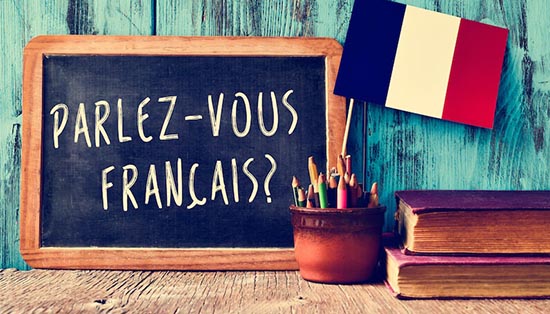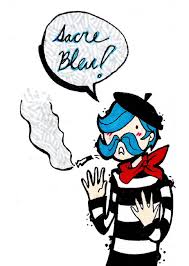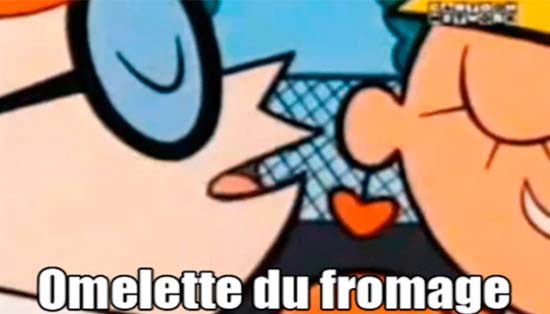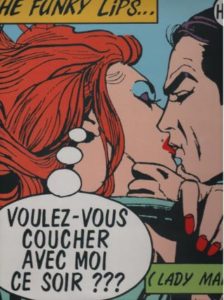
When living in Manila for a year, we met several Filipinos who said some French words or expressions that they know, whether from the phrases they heard from TV/movies, or something they picked up from a French speaker. Some of them were just the basics, which are always good to know if you speak with a French person or if you’re trying to learn the language. The others were really weird and funny!
We think the last one is really the most famous French sentence in the Philippines, isn't it? Can you guess what?

Literally: Like this, like that
Meaning: Neither good nor bad
How to use it?
When someone is asking you "how are you?". You can reply "comme ci, comme ça" if you feel so so or if you think things could be better. If a friend cooks a burger, and wants you to try, then says: "do you like it?" And you don't really, you can answer: "Hmm.. comme ci, comme ça. It's got too many pickles!"
Is it used in France?
Honestly we rarely hear this expression in France. It was maybe more popular in the 90s. Even so, it is understandable for everyone.
Literally: Good day, how are you?
How to use it? It's a basic greeting, so with the translation, we're sure you know how to use it 😉 If you are a kid in the ‘90s or early 2000’s you might have heard this phrase in a French children’s show called Madeline.
Is it used in France? A lot because it stands for the most common way to say hi to someone and ask him if he/she's okay. It is not too formal, not too informal. The formal way would be: "comment allez-vous ?" instead of "ça va ?". Then if you want it informal, you can do as in English. Instead of saying good day, you would use hi which is "salut".
When I was teaching this to people from Cebu. Some were laughing because "ça va" sounds like "sava". In the Philippines it sounds like saba which is a type of banana, so they used to tell me: "oh you want some bananas?"

Literally: Not sure if we can translate it literally. It would be something like "Holy Blue".
Meaning: Holy God.
How to use it? It is clearly a curse.
Is it used in France? Never, it is a stereotypical French curse that is not used by French people. It's a bit like the mustache and the beret. It's something that non-French people think is typical.
Literally: Yes, yes.
How to use it? It is basically how we say yes in French. We usually hear it from Filipino friends. When we are speaking French with someone and they want to get into the conversation. They'll say "oui, oui" to whatever we say to make fun and to act like they speak French as well. It's always making us laugh.
Is it used in France? Obviously, yes. And if you want to say yeah, we say it "ouai". A typical teenager would say "ouai" with a disenchanted tone when his parents would ask him something. Which - we know it very well - really get on their nerves.

Literally: Cheese omelette
How to use it? No idea. Apparently it became popular with the cartoon Dexter's Lab which was a popular cartoon to several Filipinos our age. To learn French he slept with a learning tape. But the tape got stuck and record skips over "omelette du fromage". When he woke up, that was all he could say. But it is actually working to his advantage in everything he does. So despite the uselessness of the word, people use it "for the lols."
Is it used in France? Not at all. First of all it is grammatically incorrect. It should be "omelette au fromage" which is an omelette with cheese.
Literally: My love
Meaning: Sweetheart, Love, Lover, Darling
How to use it? French is widely considered as one of the most romantic languages. Non-French speakers often use romantic-sounding French expressions. So you can use "mon amour" for your partner and also for other close loved ones.
Is it used in France? It is. You can say it when calling your loved one. Or you can say the complete sentence: "Je t'aime mon amour.", which means I love you my dearest.
Literally: That's life.
How to use it? When some situations happen in life and you can't do anything about them. You can also use it as shit happens.
Is it used in France? This expression is rather famous in English or in other languages. French people use it but it is not as popular as non-French people think it is.

Literally: Kisses kitten
Meaning: Bye dear
How to use it? At the end of a conversation, you can say "bisous chaton" to say bye to someone you really like. "Mon chaton", meaning my kitten, can be used as honey. It is not necessarily for your lover. It can also be for your best friend, little sister or brother.
Is it used in France? Yes sometimes, you can hear that when a mother is saying bye to her son/daughter over the phone for example.
Literally: Thank you very much
How to use it? Like in English. If you're in Paris and the baker is giving you the baguette you just bought, you can just answer "merci beaucoup".
Is it used in France? Every time actually, whenever we say thanks to someone we're saying it. Although French people are perceived as being snobs. If you come and say some little French words. They will really appreciate it and will give a friendly answer back.

Literally: Would you like to sleep with me (tonight)?
Meaning: You know what it means.
How to use it? It became famous through Lady Marmalade's song. And although I heard it a lot of times, people didn't know what it meant. Yet, it's a cool sentence to show you know a bit of French. But don't use it seriously.
It was even used in a Filipino soap opera years ago, and was used as a meme today: meme.
Is it used in France? Not really, it is not a great pick-up line as Americans think it is. You might get slapped saying it. So don’t even attempt using this phrase.
We've chosen 10 expressions over the mostly known ones and we've also heard: bon voyage, croissant, je t'aime, mon chéri, très bien, au revoir, joie de vivre, la vie en rose...
Comment below the ones you know! If you enjoyed reading this article, share it with your friends 🙂


Get our recommendations, tips, and exclusive content before anyone else in your email box.
I'm wondering if a lot of French people are in Manila, it's mostly populated with Backpackers, they rarely interact tho. This might help me talk with them, I kinda know what a person's nationality is thru accent. 😀
There are! You can find them at French events (Chamber of Commerce for example) or they usually hang out in Poblacion. They work and live in Manila 🙂
[…] can also read this article on our blog to learn some French basic words for your trip there. If you think this article was […]
Hi, I was really smiling as I read the article. The changes of meaning and how the expressions are used points out the fact that people sometimes just assign meaning of words according to their particular experience or attitude or preference. A wrong approach to borrowing a language though. Caution is the only way to deal with it as a Filipino who tries to speak French. Or better yet, just use the right terms to create the right meaning . Thank you. I used this as a basis for a particular topic I will discuss to my students under the point, "Same words and expressions may mean the opposite or may differ greatly depending on the perception and experiences of the communicators."
Awesome, thank you for sharing this in our blog. Hopefully it can help your student 🙂
...point out...